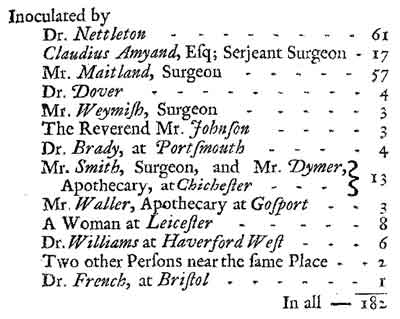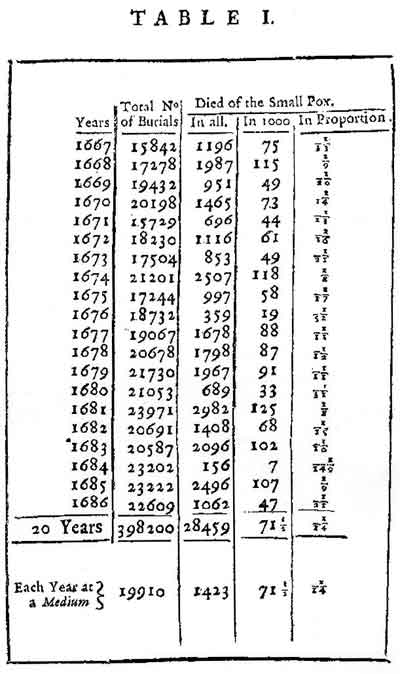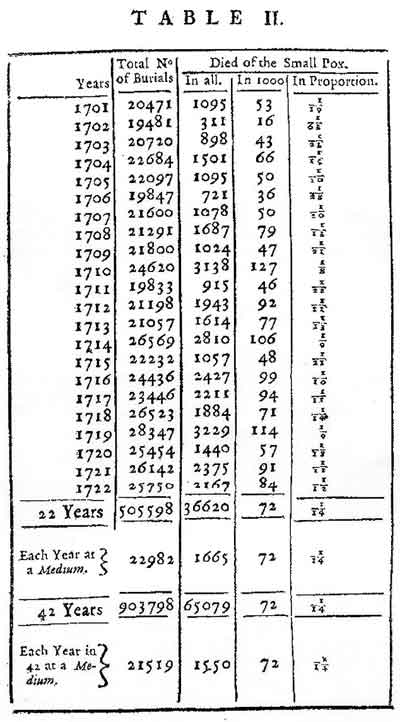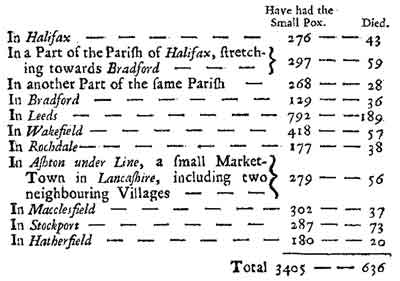SIR,
The sincere and disinterested Regard for the Good of Mankind, which
you have always manifested, as well in your extensive private Practice,
as in that publick Post, which you have so long and so usefully fill'd,
must affect you, I am sure, with a great and sensible Concern for the Destruction
made among us by that terrible Calamity the Small Pox. We have seen,
for some considerable Time past, above 100 Person per Week in this
City and Suburbs, taking one Week with another, to be carry'd off by this
Disease; a Consideration certainly that ought to dispose us to enter into
any Measures, by which we may reasonably hope to put some Stop to the Progress
of so cruel a Distemper.
To this Purpose, Sir, the Method of Inoculation, which has lately been
introduced among us, is strongly recommended on the one hand, and has been
opposed with a great deal of Warmth and Zeal on the other.
I have no Inclination to enter into this Controversy; it is in better
and abler Hands: but, as the Point in Dispute is of the utmost Importance
to Mankind, I heartily wish, that, without Passion, Prejudice, or private
Views, it may be fairly and maturely examin'd. In order to which,
if the following Extracts and Computations, concerning the comparative
Danger of the Inoculated and Natural Small Pox, may be of any Use to your
self, or to other impartial and disinterested Judges, I shall think my
Labour well bestowed.
The Number of Persons, who have had the Small Pox by Inoculation here
in England, is, by the best Information I have been able to collect,
as follows.

Out of this Number the Opposers of Inoculation affirm, that two Persons
died of the Inoculated Small Pox; the Favourers of this Practice maintain,
that their Death was occasioned by other Causes. If, to avoid dispute,
these two be allow'd to have died of Inoculation, we must estimate the
hazard of dying of the Inoculated Small Pox, as far as can be collected
from our own Experience, to be that of 2 out of 182, or one out of 91.
The Reverend Mr. Mather, in a Letter dated March 10, 1721.
from Boston in New England, gives an Account, That of near
300 inoculated there, 5 or 6 died upon it or after it, but from
other Diseases and Accidents, chiefly from having taken the Infection in
the common way by Inspiration, before it could be given them in this way
of Transplantation.
If, as we have done before, to avoid all occasion of dispute, we allow
5 out of these 300 to have died of the Small Pox by Inoculation, notwithstanding
what Mr. Mather has said of their dying by other Accidents or Diseases;
the hazard of Inoculation will thence be determin'd to be that of 1 in
about 60. But here it must be observ'd, that by all the Accounts
from New England, the Operators there appear not to have been so
cautious in the choice of their Subjects, as here in England.
For Mr. Mather tells us, that the Persons inoculated were young
and old, from 1 Year to 70, weak and strong; and
by other relations we are inform'd, that Women with Child, and
others even in Childbed, underwent the Operation. Apparently
the Greatness of the Danger they were in, from the Infection in the natural
Way, which then raged among them with the utmost Fury, made them the more
adventurous.
We come now, Sir, to the second Part of our Design, which is to form
an Estimate of the Hazard, which all Mankind, one with another, are under
of dying of the natural Small Pox, that, by comparing this with the Hazard
of Inoculation, the Publick may be enabled to form a Judgment, whether
or no the Practice of Inoculation tends to the Preservation of Mankind,
by lessening the Danger to which they are otherwise liable.
With this View I have consulted the Yearly Bills of Mortality, as far
back as the Year 1667, being the Year after the Plague and the Fire of
London,
comprehending to the present Time the Space of 56 Years, from 42 of which
I have given Extracts in the two following Tables.
The first of these takes in the first 20 Years, distinguishing for every
Year the total Number of Burials, and likewise the Number that died of
the Small Pox, in two separate Columns. The third Column shews, how
many died of the Small Pox out of every Thousand that were buried; and
the fourth Column represents the Proportion between those that died of
the Small Pox, and the whole Number of Burials, by the nearest Vulgar Fraction,
having always 1 for the Numerator.
The second Table gives the last 22 Years, after the same manner, and
at the bottom of each Table is given the Total Number for each Series of
Years, and likewise the Number that died each Year, taken at a Medium,
one Year with another: by which it appears that the Proportion between
the Number of those that die of the Small Pox, and the whole Number of
Burials, is very nearly the same, upon an Average for each Series of Years.
The 14 intermediate Years between 1686 and 1701 are left out, because
in the Bills for those Years, the Accounts of the Small Pox and Measles
are not distinguished, as in the preceding and following Years, but are
join'd together in one Article, so that from them no certain Account can
be drawn of the Number of Persons, that died of the Small Pox.
 _____________
_____________

By these Tables it appears, that upwards of seven per Cent. or
somewhat more than a fourteenth part of Mankind, die of the Small Pox;
and consequently the hazard of dying of that Distemper, to every individual
born into the World, is at least that of one in fourteen. And that
this Hazard encreases after the Birth, as the Child advances in Age, will
appear from what follows.
From this Estimate it is demonstrable, that, in the Case of Persons
actually having the Small Pox, the Hazard that they run, one with another,
of dying of that Distemper, is greater than that of one in fourteen; or,
which is the same thing, there must be fewer than thirteen, that recover,
for one that dies of the Small Pox. For since one fourteenth
part of Mankind die of the Small Pox, and the other thirteen parts die
of other Diseases; if these thirteen have all had the Small Pox, and recover'd
from it, before they fell ill of those other Diseases of which they died,
then just thirteen will have recovered from the Small Pox, for one that
dies of that Distemper: but, as it is notorious, that great Numbers,
especially of young Children, die of other Diseases, without ever having
the Small Pox, it is plain, that fewer than thirteen must recover from
this Distemper, for one that dies of it.
To determine exactly how many of these thirteen Parts of Mankind, die
without having the Small Pox, is a very difficult task: but it is
easy to see, that a considerable Deduction is to be made from them.
In the first place, the two Articles of Stil[l]born and Abortive
Children, which are put into the yearly Bills, as part of the Number
of Burials, are unquestionably to be deducted.
With these two, Sir, you will not I believe, think it unreasonable to
join the following Heads, which, by the best Information I can procure,
comprehend only very young Children, or at most not above one or two Years
of Age: Overlaid [infants inadvertantly smothered while sleeping
with their mothers], Chrysoms [infants less than a month old] and
Infants, Convulsions, Horseshoehead [the condition of
an infant's skull in which the sutures are too open, the coronal suture
presenting the form of a horsehoe], Headmoldshot [the condition
of an infant's skull in which the sutures ride, or are shot, over each
other], Teeth [death of an infant that is teething], Water in
the Head, Worms, Rickets, Livergrown [enlarged
liver? colicky restlessness common in premature infants?], Chin-Cough,
and
Hooping-Cough, which Articles in the Yearly Bills for 22 Years last
past, amount at a Medium to 386 in each 1000, of the whole Number of Burials.
It is true indeed, that, in all Probability, some small part of these
must have gone thro' the Small Pox, and therefore ought not to be deducted
out of the Account: but then, on the other hand, as it is certain,
that of the remaining 614/1000 of Mankind, that are above one or two Years
of Age, there are great Numbers, that never have the Small Pox, it will
I presume be judged to be no unequal Supposition, if I suppose all that
are contain'd under the Heads abovemention'd to have miss'd that Distemper,
when by way of Compensation, I allow all the remainder of Mankind to undergo
it; which Concession is so large, that it will abundantly make up for what
I assume too much in the former Supposition.
Allowing therefore, that out of every 1000 Children that are born, 386
die under one or two Years of Age, without having the Small Pox, and 72
do some time or other die of that Distemper; it follows, that the Hazard
of dying of it, to the remainder of Mankind, above one or two Years of
Age, who are all supposed to undergo that Disease sooner or later, is that
of 72 out of 614, or nearly 2 out of 17: so that no more, than
between 7 and 8, can recover from that Distemper, for one
that dies of it. And if any consi[de]rable part of the aforesaid
remainder of Mankind, more than is allow'd for above, do escape having
the Small Pox, then the Proportion of those that recover from it, will
be still smaller.
This Consideration shews the Fallacy of one plausible Argument, that
has been often made use of on occasion of the present Disputes about Inoculation:
Which is, that whatever be the Danger of dying of the Small Pox, to those
that actually have that Disease, yet, as great Numbers of Persons never
have the Small Pox at all, this Danger is what any particular Person may
never be in; and therefore it will be Madness to undergo the hazard of
Inoculation, be it great or small, in order to prevent a Disease, which
possibly may never befal[l] one.
For if two parts in seventeen of all Mankind, that are above one or
two Years of Age, must sooner or later die of the Small Pox, it is plain,
that how many parts soever of these seventeen are supposed to escape that
Distemper, the Mortality among the remainder, who undergo it, must in proportion
be so much the greater. As for instance, if 7 parts escape having
the Small Pox, and 10 undergo it, then 2 out of 10, or 1 out of 5, that
have the Small Pox, must die of that Disease.
And as it can never be known, whether or no any particular Person be
one of those, that are to have the Small Pox; his Hazard of dying of that
Distemper, being made up of the Hazard of having it, and the Hazard of
dying of it, if he has it, will be exactly the same, namely, that of 2
in 17, or 1 in 8 or 9, whether the proportion of Mankind, that escape having
the Small Pox, be great or small.
But as what has been said concerning the Hazard of the natural Small
Pox, is taken from an Account of 42 Years; whereas the Hazard of Inoculation
is estimated only from what has happen'd in the space of about 18 Months,
since which time it had its first Rise among us; it will perhaps be asked
by some Persons, why we do not likewise make the Estimate of the hazard
of the natural Small Pox, from the last two Years alone, without running
back into so great a number of Years, before Inoculation was begun?
To which we answer, that the Proportion of those that die of the Small
Pox, varies so much in different Years, as appears from the Tables above,
that it was impossible to come at any Certainty in this point, from the
consideration of the two last Years alone: and if any one suspects
us of Partiality in proceeding after the manner we have done, he need only
cast his Eyes upon the second Table, where he will find that the Mortality
of the natural Small Pox, for the two last Years, has considerably exceeded
the Medium we have determin'd from taking in two and fourty Years.
There is another Method, which, if it were put in practice in several
large Towns, or Parishes, and for a sufficient Number of Years, would enable
us to come at a nearer and still more certain Computation of the Proportion
between those that recover, and those that die of the Small Pox:
which is, to send a careful Person once a Year, from house to house, to
enquire what Persons have had the Small Pox, and how many have died of
it, in the preceding Year. This has been done by Dr. Nettleton
the last Year, at several Towns in Yorkshire, &c. and the same
was done at Chichester for the same Year, to the 15th of October
last, by a Person of Credit, whose Account was communicated to me by my
learned and ingenious Friend, Dr. Whitaker. Such another Account
has been transmitted to me from Haverford West, in South Wales,
by the Learned Dr. Perrot Williams, Physician in that Place.
The Sum of these Accounts is as follows.
| |
Sick of the Small Pox. |
Died. |
| Several Towns in Yorkshire |
3405
|
636
|
| Chichester |
994 |
168 |
| Haverford West |
227
|
52
|
|
Total
|
4626 |
856 |
From which it appears, that, upon a Medium between these Accounts,
there died of the Small Pox almost 19 per Cent. or nearly one
in five, of Persons of all Ages, that underwent that Distemper.
Which is the more to be remarked, for that out of 82 Persons,
that had the Small Pox by Inoculation, the same Year, and in the Neighbourhood
of the same Places, not one miscarry'd.
Mr. Mather observes, in his Letter mention'd above, that out
of more than 5000 Persons that had the Small Pox at Boston
in New England, within little more than half a Year, near 900 died,
which is more than one in six; and this Account added to those from Yorkshire,
Chichester,
and Wales, reduces the Proportion of those that die of the Small
Pox to somewhat more than 18 per Cent. so that the Hazard of dying
of that Distemper, to those who are taken ill of it, is that of one
in between five and six, or something above two in eleven.
The Result therefore, Sir, of these Computations is, that, if the same
Proportions should still continue, as have hitherto been determin'd by
Observation, we must expect,
That of all the Children that are born, there will, some time
or other, die of the Small Pox, one in fourteen.
That of Persons of all Ages taken ill of the natural Small Pox, there
will die of that Distemper, one in five or six, or two in eleven.
That of Persons of all Ages inoculated, without regard to the Healthiness
or Unhealthiness of the Subject, as was practised in New England,
there will die one in sixty.
That of Persons inoculated with the same Caution in the choice of the
Subjects, as has been used by the several Operators one with another, here
in England, (if we allow in the two disputed Cases abovemention'd,
that the Persons died of the inoculated Small Pox) there will die one
in ninety one.
But if those two Persons be allowed to have died of other Accidents or
Diseases, then we shall have reason to think, as far as any Judgement can
be made from our own Experience here in England, that none at
all will die of Inoculation, provided that proper Caution be sued;
as we are inform'd, on all hands, is the Case in Turkey: where
out
of many thousands, that, in the space of about fourty Years past, have
been inoculated in and about Constantinople, by one Greek
Woman, who still continues that Practice, notwithstanding her extreme old
Age, not so much as one Person has miscarried, as I am assured by
the ingenious Dr. le Duc, a Native of Constantinople, who
was himself inoculated there under the Care of his Father, an eminent Physician
in that City.
I am, &c.
James Jurin
POSTSCRIPT
Since this Paper was drawn up and communicated to the Royal Society,
the following Account of the Success of Inoculation in and about Boston,
in New England, was procured at my Desire, by my Ingenious Friend
Dr. Nesbitt, from Capt. John Osborne, who resided in that
Town and Neighbourhood during the whole time of that Practice. I
think proper to insert it here, as it confirms the Extract given above
from Mr. Mather's Relation, and is a more particular Account of
the Matter of Fact, than any that I have yet seen.
In May, 1721, the Small Pox was, by the Providence of God, brought
into the Town of Boston; in June it began to spread pretty
much, and in the Month of July it was got into most parts of the
Town, and a considerable Number of People died of it. At this time
Inoculation was first put in practice by Dr. Boyleston, who then
perform'd it upon his own Child and a Negro-Servant, who both did well;
notwithstanding which, this Attempt gave great Uneasiness to the Neighbours.
However the Practice went on, to the Number of about 40 Persons, one of
which was a Woman (Mrs. Dixwell.) of about 40 or 45 Years of Age,
who got well over the Small Pox, as her Husband publickly declared, but
had been before troubled with Hysterick Fits, of which she died some little
time after. When about 70 Persons had passed under the Operation,
myself and Wife, who had hitherto been at a Place called Roxbury,
a Mile from Boston, went into Town and received the Small Pox by
Inoculation. We had it with all the Gentleness and Moderation that
was possible, neither of us having an hundred Pustules, or being sensible
of any Fever worth mentioning; so that we did not find it necessary to
keep our Beds for it.
In August the Small Pox in the natural Way proved more mortal,
and Inoculation made a greater Progress, the People continuing to come
into the Practice of it. A second Person that died after Inoculation,
was an Apothecary's Housekeeper, that was out of Town, till an Indian
Maid got the distemper in the same House, and remov'd, and died.
Upon which this Woman coming to Town, her Master undertook to perform the
Operation upon her, which by the Way was the first and last that he ever
perform'd; and on the third Day after the Inoculation, the Small Pox came
out upon her very full; from which it was plain, that she had taken the
Infection before, in the common way.
The third Person that died after being inoculated, was a Gentleman (John
White, Esq.), that lodged in the same House with my Wife and self
at Roxbury, who was under great and extreme Infirmity of Body, as
myself was Witness, that we fear'd he would have lived but a short time
under it. His Friends much persuaded him to make use of Inoculation,
believing that it would have carry'd off his Illness; but when he made
the Experiment, he had not Strength to go thro' with it. He was about
45 Years of Age, and by the way was a Gentleman of great Worth and Piety.
His Sister (Mrs. Wells.) was the fourth Person that died upon
this Operation. She was about fourty Years of Age, of great Indisposition
of Body, and weak, as was her Brother.
The fifth, that died upon Inoculation, was a Woman Servant in a House,
where the whole Family, to the number of eight, were inoculated at the
same time. She lay in a cold upper Room during her Illness, and was
much neglected, the whole Family being down together, so that she died
merely for want of a little Attendance. This was in the Town of Roxbury,
where observe, that 13 Men, Masters of Families, got the Small Pox, and
all died; which inclined the People to make use of Inoculation, having
before been much against it, and there were 43 Men inoculated there, who
all did well. The Minister of the Town (The Reverend Mr. Walter.)
was the first, that put it in Practice there, much against the Mind of
his People at first, though afterwards they were very well pleas'd with
it, seeing with what great Success it was attended; and then whole Families
came into it, and underwent the Operation. There were in all at least
280 Persons inoculated, that I knew of, and I suppose there might be about
20 or 30 more, but of those I can give no certain Account.
John Osborne. |





